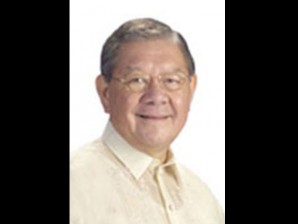Chief Justice Renato Corona on Wednesday asked the Senate to subpoena six members of the House of Representatives, led by Speaker Feliciano Belmonte, in connection with the alleged railroading of the impeachment complaint against him last month.
Senate President Juan Ponce Enrile, the presiding officer of the impeachment court, on Wednesday expressed reservations on whether the chamber could subpoena members of the Lower House, a coequal branch, citing “interparliamentary courtesy.”
“I would like to get the position of the members of the Senate because we have to define whether we could subpoena … our counterparts in the House of Representatives,” he told reporters after Corona’s lawyer, Jose Roy III, filed the request at 3:40 p.m.
Also the subjects of Corona’s request for summons were Representative Niel Tupas Jr., the chief House prosecutor, former Deputy Speaker Jesus Crispin Remulla, Representatives Herminaldo Mandanas of Batangas and Tobias Tiangco of Navotas City, and House Secretary General Marilyn Yap.
In his two-page request, Corona wanted Belmonte and the others to “appear for examination before the impeachment court as to their personal knowledge and statements regarding the circumstances and events that transpired on Dec. 12, 2011, which led to (his) impeachment.”
That day, 188 congressmen signed and approved for transmittal to the Senate the impeachment complaint against Corona even though some of them later said that they had not read the document.
The signing took place reportedly after House leaders, led by members of President Benigno Aquino III’s Liberal Party, discussed the case against Corona in a PowerPoint presentation.
Remulla, Mandanas and Tobias all objected to the approach and did not sign the complaint. Remulla later resigned as deputy speaker while Mandanas was removed as chairman of the powerful ways and means committee.
Corona’s camp earlier filed a motion seeking a preliminary hearing on the validity of the impeachment complaint. Senators, sitting as an impeachment court, are set to tackle the motion when the trial opens on Monday.
A question of mandate
Enrile also reacted to pending petitions urging the Supreme Court to stop the impeachment trial. Asked if the high court could do so at this point, he said: “I don’t think so.”
“I will have to see whether a (temporary restraining order) is possible because otherwise, the Supreme Court can cancel out the mandate given to the Senate to try and decide (impeachment cases),” he said.
“The one ordered to try and decide impeachment cases is the Senate so I don’t think the Supreme Court can reinterpret the Constitution,” he said.
“The Supreme Court has the power, in my opinion, to review the basis of the impeachment, but once it reaches the Senate, they cannot say that there is an abuse of discretion because we have not proceeded yet,” he said.
“When the case is transferred to the Senate, the mandate of the Senate (states that) trial shall forthwith proceed.”
Prepared for the worst
In an intimate gathering with his family and legal team last week, Corona said he was preparing for the worst, including the possibility of conviction.
“I expect to be maimed here,” Ramon Esguerra, one of Corona’s lawyers, quoted the Chief Justice as saying. “But let it not be said that I have not stood up to defend the institution that I represent.”
The five-hour gathering that lasted till midnight took place in a house in Makati City on Friday—10 days before the start of his impeachment trial for alleged culpable violation of the Constitution, betrayal of public trust, and graft and corruption.
Esguerra said in an interview with the Inquirer that about 20 guests that Corona was “expecting the worst” and was open to losing his post either in the event of a conviction, or through a so-called “Plan B” earlier announced by Malacañang.
The Palace last week announced that Mr. Aquino had ordered a search for a successor to Corona—even if he is acquitted—under an alternative plan for his ouster. Details were not disclosed, but pro-Aquino columnists have been talking about an “occupy Supreme Court” movement to get rid of Corona.
“Of course, he’s hoping that he will be acquitted, but he’s also ready for a conviction. That’s how we sized him up. He’s ready. His family is ready,” said Esguerra (no relation to this reporter).
Point of no return
The lawyers asked Corona about the possibility of his throwing in the towel midway through the trial. “No, I have reached the point of no return,” the Chief Justice replied, according to Esguerra.
“I’ve discussed this with my family. I’ve discussed this with some close friends. I have sought spiritual advice and if I believe I am on the side of truth, then whatever comes, I will have to accept it. So be it,” he quoted Corona as saying.
“We are mindful of (Plan B), whatever number or letter you give to that plan,” Esguerra said. “But of course, that is, by any measure, extraconstitutional. So if they want to do that and the people follow them in that particular initiative, what can we do?”
But Esguerra warned that such an approach would set a “very dangerous precedent for anyone who will become a justice of the Supreme Court, that if your decision or opinion is against that of the administration’s they will actually harness the resources of Congress, the Lower House against you.”
Battling on two fronts
Esguerra said Corona was battling on two fronts—in the impeachment court and in the court of public opinion.
He noted that while Corona’s satisfaction rating plunged as per the latest Social Weather Stations survey, his chief accuser, Mr. Aquino, remained popular.
“It’s a more difficult fight in terms of public opinion,” Esguerra admitted.
